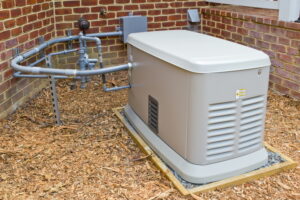If you’re considering a generator for your home, you have two choices: A stand-alone portable generator or a whole-house generator. Portable generators may seem like a simple choice, but they can be costly and potentially dangerous to operate. The alternative is a whole-house generator that is ready to switch on automatically whenever the need arises.
Portable Generators vs. Whole-House Generators
A portable generator is usually smaller and designed to run a few home appliances for a short period of time. Construction sites often use portable generators to power their tools and equipment. If the power goes out in your home, you can use a portable generator to supply energy to your fridge, oven, or a small window air conditioner. They typically run on gasoline, so you need to have fuel on hand in case of emergencies.
A whole-house generator is larger in both size and use. It connects directly to your home’s source of natural gas or propane and automatically turns on if the electrical grid goes out. You choose which appliances get priority and even have a whole-house generator strong enough to power everything in your home.
Reasons to Choose a Whole-House Generator
A whole-house generator connects directly to your home’s electrical system in addition to your natural gas or propane source. Sensors identify when the power goes out and switches on automatically to power your home. Additional benefits include:
- Always on standby – Your generator is always ready to turn on. If the power goes out while you’re away at work, you don’t have to worry about manually turning it on.
- Fuel efficient – Natural gas is a better fuel source than gasoline fuel that you’d put in your car. Your whole-house generator creates electricity with minimal natural gas usage. Plus, you don’t have to worry about refilling the fuel tank or running out of fuel.
- Safe to use – Portable generators use gasoline that produces carbon monoxide fumes. If you don’t have an outdoor area to store the generator, these fumes can get trapped in your home or garage. They also create fire risks. Natural gas offers a cleaner burn and is already hooked up to your house for constant use.
Maintenance for a Whole-House Generator
Portable generators can be a cheaper option, but they may not last as long as a whole-house generator. Your standby generator may be approved to run for thousands of hours with proper maintenance, which includes:
- Checking spark plugs
- Changing out filters
- Reviewing switches
- Ensuring the alternator is in peak condition
- Lubricating all parts
With proper maintenance, a whole-house generator can last you for years to come. That way when your power goes out your generator is ready to:
- Keep your refrigerator running and food cold
- AC unit operating and home cooled or heated
- Appliances ready for use
- Lights operating throughout your home
At Covenant Heating and Cooling, we are “Dedicated to the Promise of Serving You!” Contact us today to schedule installation and maintenance to prevent the need for generator repair in Nashville, TN, and whatever other generator services you need.

